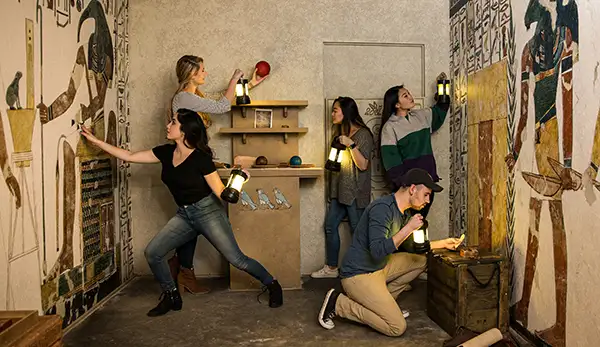Team Strategies: Just How to Collaborate Efficiently in an Escape Room
Teams have to actively pay attention to each participant's insights, appoint functions that align with private strengths, and keep routine check-ins to ensure focus and protect against redundancy. By promoting a setting that values cohesion and flexibility, teams can significantly increase their efficiency and success prices.
Establish Clear Communication

To facilitate clear communication, it is important to mark a central point of call for information dissemination. Quick, focused updates from each team participant can keep the group educated without frustrating them with information.

Designate Roles Purposefully
While clear interaction sets the structure for effective teamwork, assigning functions strategically makes sure that each employee's strengths are made use of efficiently. In a getaway area situation, the time-sensitive and complex nature of obstacles necessitates an efficient method to job delegation. By determining and leveraging specific proficiencies, groups can enhance their analytic abilities and boost general efficiency.
First, evaluate the distinct abilities and attributes of each participant. Somebody with an eager eye for detail could stand out in locating covert items, while a sensible thinker can be better fit to addressing puzzles. It's similarly vital to have a leader who can supervise development, take care of the timeline, and make decisive phone calls when needed. This duty typically calls for solid organizational and interpersonal skills.
2nd, make sure that duties are flexible and adaptable. As new challenges emerge, the team must be able to pivot, reallocating tasks as required. This adaptability helps maintain momentum and prevents bottlenecks that could occur because of stiff duty assignments.
Ultimately, a calculated technique to function task not only maximizes the toughness of each group participant however likewise fosters a natural setting, driving the team towards an effective escape.
Utilize Diverse Abilities
Identifying and using the diverse skills within your team can considerably elevate your efficiency in a getaway area. Each group member brings distinct strengths to the table, and effectively leveraging these abilities can expedite analytic and enhance total efficiency. As an example, a staff member with solid analytical skills could stand out at deciphering complicated codes or patterns, while another with keen empirical abilities might rapidly detect covert hints that might ignore.
Effective interaction is key to using these varied skills. Encourage employee to voice their insights and ideas immediately, guaranteeing that all prospective remedies are considered. This inclusive method promotes a vibrant setting where creativity and critical reasoning can prosper. Additionally, appointing jobs that straighten with each participant's strengths can avoid bottlenecks and guarantee that progress is constant.
Furthermore, variety in skills commonly equates to variety in believing designs, which is invaluable in an escape space setup. While some difficulties might need logical thinking have a peek at this site and accuracy, others might take advantage of creative and lateral reasoning. By acknowledging and leveraging this diversity, teams can resolve a broader series of difficulties extra efficiently, therefore enhancing their chances of an effective retreat.
Manage Time Efficiently

First, allot preliminary minutes for a fast survey of the area. Identify noticeable puzzles and separate tasks based upon group participants' strengths, ensuring that nobody is still. Set internal time checkpoints to examine development regularly; for example, aim to have half the puzzles fixed see by the mid-point of the game. This practice can assist maintain the group concentrated and stop time from sliding away undetected.
Additionally, prevent one-track mind. If a puzzle is taking as well long, rotate staff member or move on to one more obstacle, returning later on with fresh viewpoints. Interaction is critical-- maintain everyone updated on solved problems and remaining jobs to prevent redundant initiatives.
Last but not least, utilize any type of tips or ideas moderately but tactically - best escape room. Recognizing when to request for aid can save valuable time. By adhering to these time administration principles, groups can considerably enhance their opportunities of an effective and pleasurable getaway room experience
Debrief and Reflect
Representation is an essential aspect of group development and improvement in the context of getaway areas. Once the obstacle is completed, whether efficiently or otherwise, it is vital for the team to take part in an navigate to these guys organized debriefing session. This process allows group members to evaluate their performance, identify strengths, and determine locations for improvement.
Start the debrief by reviewing what went well. Highlight particular circumstances of efficient interaction, analytical, and cooperation. Recognizing these positive behaviors reinforces them and urges their repetition in future difficulties.
Next, deal with the barriers ran into. Discuss moments of complication, miscommunication, or inefficient techniques. Urge an open and constructive dialogue where staff member can share their point of views without anxiety of objection. This cultivates a society of constant improvement and discovering.
Conclusion
In verdict, effective partnership in a getaway space is based upon clear interaction, strategic function tasks, the efficient use of diverse skills, and efficient time administration. Routine check-ins and organized debriefings are necessary for keeping focus and cultivating continual improvement. By developing a natural and adaptive group atmosphere, the probability of efficiently resolving puzzles and achieving the purpose of leaving the space is significantly boosted. This technique not just ensures success however also promotes cumulative growth and learning.